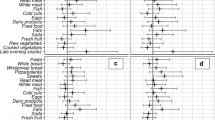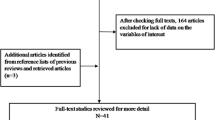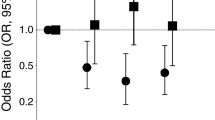Abstract
Objective
Eating behaviors, such as the timing, speed of eating, and frequently consuming hot drinks, fried, spicy, or barbecued foods may be associated with increased risks of esophageal cancer. We analyzed data from a population-based case–control study to examine whether eating behaviors are associated with risk of esophageal cancer.
Methods
Self-administered questionnaire was used to collect data on demographic, socioeconomic, and lifestyle characteristics, and a food frequency questionnaire was used to collect data on dietary behaviors from 1,472 control subjects, 286 cases with adenocarcinoma of the esophagus, 320 cases with esophagogastric junction adenocarcinoma (EGJAC), and 238 cases with esophageal squamous cell carcinoma (ESCC). We calculated odds ratios (ORs) and 95% confidence intervals (CIs) using unconditional multivariable adjusted logistic regression, adjusting for confounders.
Results
Frequency of hot drinks, home-fried foods, barbecued meats, spicy foods, and the timing of eating an evening meal were not associated with esophageal cancer risk. Those who frequently consumed fried ‘take-away’ food had increased risks of EGJAC (OR = 1.44, 95% CI = 1.01–2.05; p value = 0.04). Eating speed was inversely associated with ESCC risk (p for trend = 0.001).
Conclusion
We found no evidence that consumption of hot drinks, barbecued meats, spicy foods, or the timing of the evening meal are associated with increased risk of esophageal cancer in this Australian population. Associations with consumption of fried ‘take-away’ foods and eating speed await confirmation in future studies.
Similar content being viewed by others
References
Parkin DM, Bray F, Ferlay J, Pisani P (2005) Global cancer statistics, 2002. CA Cancer J Clin 55(2):74–108
World Cancer Research Fund/American Institute for Cancer Research (2007) Food, nutrition, physical activity, and the prevention of cancer: a global perspective. AICR, 2007, Washington
Gallus S, La Vecchia C (2007) Is there a link between diet and esophageal cancer? Nat Clin Pract Gastroenterol Hepatol 4:2–3
Holmes RS, Vaughan TL (2007) Epidemiology and pathogenesis of esophageal cancer. Semin Radiat Oncol 17:2–9
Chen X, Yang CS (2001) Esophageal adenocarcinoma: a review and perspectives on the mechanism of carcinogenesis and chemoprevention. Carcinogenesis 22(8):1119–1129
Lord RV, Law MG, Ward RL, Giles GG, Thomas RJ, Thursfield V (1998) Rising incidence of oesophageal adenocarcinoma in men in Australia. J Gastroenterol Hepatol 13(4):356–362
Thomas RJS, Lade S, Giles GG, Thursfield V (1996) Incidence trends in oesophageal and proximal gastric carcinoma in Victoria. Aust NZ J Surg 66(5):271–275
Stavrou EP, McElroy HJ, Baker DF, Smith G, Bishop JF (2009) Adenocarcinoma of the oesophagus: incidence and survival rates in New South Wales, 1972–2005. Med J Aust 191(6):310–314
Castellsague X, Munoz N, De Stefani E, Victora CG, Castelletto R, Rolon PA (2000) Influence of mate drinking, hot beverages and diet on esophageal cancer risk in South America. Int J Cancer 88(4):658–664
Mason JB, Dickstein A, Jacques PF, Haggarty P, Selhub J, Dallal G et al (2007) A temporal association between folic acid fortification and an increase in colorectal cancer rates may be illuminating important biological principles: a hypothesis. Cancer Epidemiol Biomarkers Prev 16(7):1325–1329
Islami F, Pourshams A, Nasrollahzadeh D, Kamangar F, Fahimi S, Shakeri R et al (2009) Tea drinking habits and oesophageal cancer in a high risk area in northern Iran: population based case–control study. BMJ 338:b929
Terry P, Lagergren J, Wolk A, Nyren O (2001) Drinking hot beverages is not associated with risk of oesophageal cancers in a Western population. Br J Cancer 84(1):120–121
Galeone C, Pelucchi C, Talamini R, Levi F, Bosetti C, Negri E et al (2005) Role of fried foods and oral/pharyngeal and oesophageal cancers. Br J Cancer 92(11):2065–2069
Abnett CC (2007) Carcinogenic food contaminants. Cancer Invest 25:189–196
Pelucchi C, Franceschi S, Levi F, Trichopoulos D, Bosetti C, Negri E et al (2003) Fried potatoes and human cancer. Int J Cancer 105(4):558–560
Castelleto R, Castellsague X, Munoz N, Iscovich J, Chopita N, Jmelnitsky A (1994) Alcohol, tobacco, diet, mate drinking, and esophageal cancer in Argentina. Cancer Epidemiol Biomarkers Prev 3:557–564
De Stefani E, Munoz N, Esteve J, Vasallo A, Victora CG, Teuchmann S (1990) Mate drinking, alcohol, tobacco, diet, and esophageal cancer in Uruguay. Cancer Res 50(2):426–431
Ward MH, Sinha R, Heineman EF, Rothman N, Markin R, Weisenburger DD et al (1997) Risk of adenocarcinoma of the stomach and esophagus with meat cooking method and doneness preference. Int J Cancer 71(1):14–19
Phukan RK, Chetia CK, Ali MS, Mahanta J (2001) Role of dietary habits in the development of esophageal cancer in Assam, the north-eastern region of India. Nutr Cancer 39(2):204–209
Piesman M, Hwang I, Maydonovitch C, Wong RK (2007) Nocturnal reflux episodes following the administration of a standardized meal. Does timing matter? Am J Gastroenterol 102(10):2128–2134
Wu M, Zhao JK, Hu XS, Wang PH, Qin Y, Lu YC et al (2006) Association of smoking, alcohol drinking and dietary factors with esophageal cancer in high- and low-risk areas of Jiangsu Province, China. World J Gastroenterol 12(11):1686–1693
Whiteman DC, Sadeghi S, Pandeya N, Smithers BM, Gotley DC, Bain CJ et al (2008) Combined effects of obesity, acid reflux and smoking on the risk of adenocarcinomas of the oesophagus. Gut 57:173–180
Spechler SJ, Dixon MF, Genta R, Hainaut P, Lambert R, Siewert R (2000) Adenocarcinoma of the oesophago-gastric junction. In: Hamilton SR, Aaltonen LA (eds) Pathology and genetics Tumours of the digestive system WHO classification of tumours, vol 2, 3rd edn. IARC Press, Lyon
Willett W, Sampson L, Stampfer MJ, Rosner B, Bain C, Witschi J et al (1985) Reproducibility and validity of a semiquantitative food frequency questionnaire. Am J Epidemiol 122:51–65
Ashton BA, Marks GC, Battistutta D, Green AC, The Nambour Study Group (1996) Under reporting of energy intake in two methods of dietary assessment in the Nambour trial. Aust J Nutr Diet 53:53–60
Marks GC, Hughes MC, van der Pols JC (2006) Relative validity of food intake estimates using a food frequency questionnaire is associated with sex, age, and other personal characteristics. J Nutr 136:459–465
McNaughton SA, Marks GC, Gaffney P, Williams G, Green AC (2005) Validation of a food-frequency questionnaire assessment of carotenoid and vitamin E intake using weighed food records and plasma biomarkers: the method of triads model. Eur J Clin Nutr 59:211–218
Food Standards Australia New Zealand (2007) NUTTAB 2006—Australian food composition tables. FSANZ, Canberra
Hung HC, Huang MC, Lee JM, Wu DC, Hsu HK, Wu MT (2004) Association between diet and esophageal cancer in Taiwan. J Gastroenterol Hepatol 19(6):632–637
Onuk MD, Oztopuz A, Memik F (2002) Risk factors for esophageal cancer in eastern Anatolia. Hepatogastroenterology 49:1290–1292
Ke L, Yu P, Zhang ZX, Huang SS, Huang G, Ma XH (2002) Congou tea drinking and oesophageal cancer in South China. Br J Cancer 86:346–347
Sharp L, Chilvers CE, Cheng KK, McKinney PA, Logan RF, Cook-Mozaffari P et al (2001) Risk factors for squamous cell carcinoma of the oesophagus in women: a case–control study. Br J Cancer 85:1667–1670
Kinjo Y, Cui Y, Akiba S, Watanabe S, Yamaguchi N, Sobue T et al (1998) Mortality risks of oesophageal cancer associated with hot tea, alcohol, tobacco and diet in Japan. J Epidemiol 8(4):235–243
Garidou A, Tzonou A, Lipworth L, Signorello LB, Kalapothaki V, Trichopoulos D (1996) Life-style factors and medical conditions in relation to esophageal cancer by histologic type in a low-risk population. Int J Cancer 68(3):295–299
Terry PD, Lagergren J, Wolk A, Steineck G, Nyren O (2003) Dietary intake of heterocyclic amines and cancers of the esophagus and gastric cardia. Cancer Epidemiol Biomarkers Prev 12(9):940–944
Takezaki T, Gao CM, Wu JZ, Ding JH, Liu YT, Zhang Y et al (2001) Dietary protective and risk factors for esophageal and stomach cancers in a low-epidemic area for stomach cancer in Jiangsu Province, China: comparison with those in a high-epidemic area. Jpn J Cancer Res 92:1157–1165
Gao YT, McLaughlin JK, Gridley G, Blot WJ, Ji BT, Dai Q et al (1994) Risk factors for esophageal cancer in Shanghai, China. II. Role of diet and nutrients. Int J Cancer 58(2):197–202
Friedman M, Levin CE (2008) Review of methods for the reduction of dietary content and toxicity of acrylamide. J Agric Food Chem 56(15):6113–6140
Smith KJ, McNaughton SA, Gall SL, Blizzard L, Dwyer T, Venn AJ (2009) Takeaway food consumption and its associations with diet quality and abdominal obesity: a cross-sectional study of young adults. Int J Behav Nutr Phys Act 6:29
Wang JM, Xu B, Rao JY, Shen HB, Xue HC, Jiang QW (2007) Diet habits, alcohol drinking, tobacco smoking, green tea drinking, and the risk of esophageal squamous cell carcinoma in the Chinese population. Eur J Gastroenterol Hepatol 19(2):171–176
Acknowledgments
We are grateful to the Matt Filson Research Fund for the additional funding provided to support this project. The Australian Cancer Study was supported by the National Health and Medical Research Council (NHMRC) of Australia (Program no.199600). DCW is supported by a Principal Research Fellowship from the NHMRC of Australia.
Conflict of interest statement
None of the authors had a personal or financial conflict of interest.
Author information
Authors and Affiliations
Consortia
Corresponding author
Appendix: The Australian Cancer Study Investigators
Appendix: The Australian Cancer Study Investigators
Investigators: David C. Whiteman MBBS, PhD, Penelope M. Webb MA, D Phil, Adele C. Green MBBS, PhD, Nicholas K. Hayward PhD, Peter G. Parsons PhD, David M. Purdie PhD.
Clinicalcollaborators: B. Mark Smithers FRACS, David Gotley FRACS PhD, Andrew Clouston FRACP PhD, Ian Brown FRACP.
ProjectManager: Suzanne Moore RN, MPH.
Database: Karen Harrap BIT, Troy Sadkowski BIT.
ResearchNurses: Suzanne O’Brien RN MPH, Ellen Minehan RN, Deborah Roffe RN, Sue O’Keefe RN, Suzanne Lipshut RN, Gabby Connor RN, Hayley Berry RN, Frances Walker RN, Teresa Barnes RN, Janine Thomas RN, Linda Terry RN MPH, Michael Connard B Sc, Leanne Bowes B Sc, MaryRose Malt RN, Jo White RN.
Clinical contributors
Australian Capital Territory: Charles Mosse FRACS, Noel Tait FRACS.
New South Wales: Chris Bambach FRACS, Andrew Biankan FRACS, Roy Brancatisano FRACS, Max Coleman FRACS, Michael Cox FRACS, Stephen Deane FRACS, Gregory L. Falk FRACS, James Gallagher FRACS, Mike Hollands FRACS, Tom Hugh FRACS, David Hunt FRACS, John Jorgensen FRACS, Christopher Martin FRACS, Mark Richardson FRACS, Garrett Smith FRACS, Ross Smith FRACS, David Storey FRACS.
Queensland: John Avramovic FRACS, John Croese FRACP, Justin D’Arcy FRACS, Stephen Fairley FRACP, John Hansen FRACS, John Masson FRACP, Les Nathanson FRACS, Barry O’Loughlin FRACS, Leigh Rutherford FRACS, Richard Turner FRACS, Morgan Windsor FRACS.
SouthAustralia: Justin Bessell FRACS, Peter Devitt FRACS, Glyn Jamieson FRACS, David Watson FRACS.
Victoria: Stephen Blamey FRACS, Alex Boussioutas FRACP, Richard Cade FRACS, Gary Crosthwaite FRACS, Ian Faragher FRACS, John Gribbin FRACS, Geoff Hebbard FRACP, George Kiroff FRACS, Bruce Mann FRACS, Bob Millar FRACS, Paul O’Brien FRACS, Robert Thomas FRACS, Simon Wood FRACS.
WesternAustralia: Steve Archer FRACS, Kingsley Faulkner FRACS, Jeff Hamdorf FRACS.
Rights and permissions
About this article
Cite this article
Ibiebele, T.I., Taylor, A.R., Whiteman, D.C. et al. Eating habits and risk of esophageal cancers: a population-based case–control study. Cancer Causes Control 21, 1475–1484 (2010). https://doi.org/10.1007/s10552-010-9576-8
Received:
Accepted:
Published:
Issue Date:
DOI: https://doi.org/10.1007/s10552-010-9576-8




